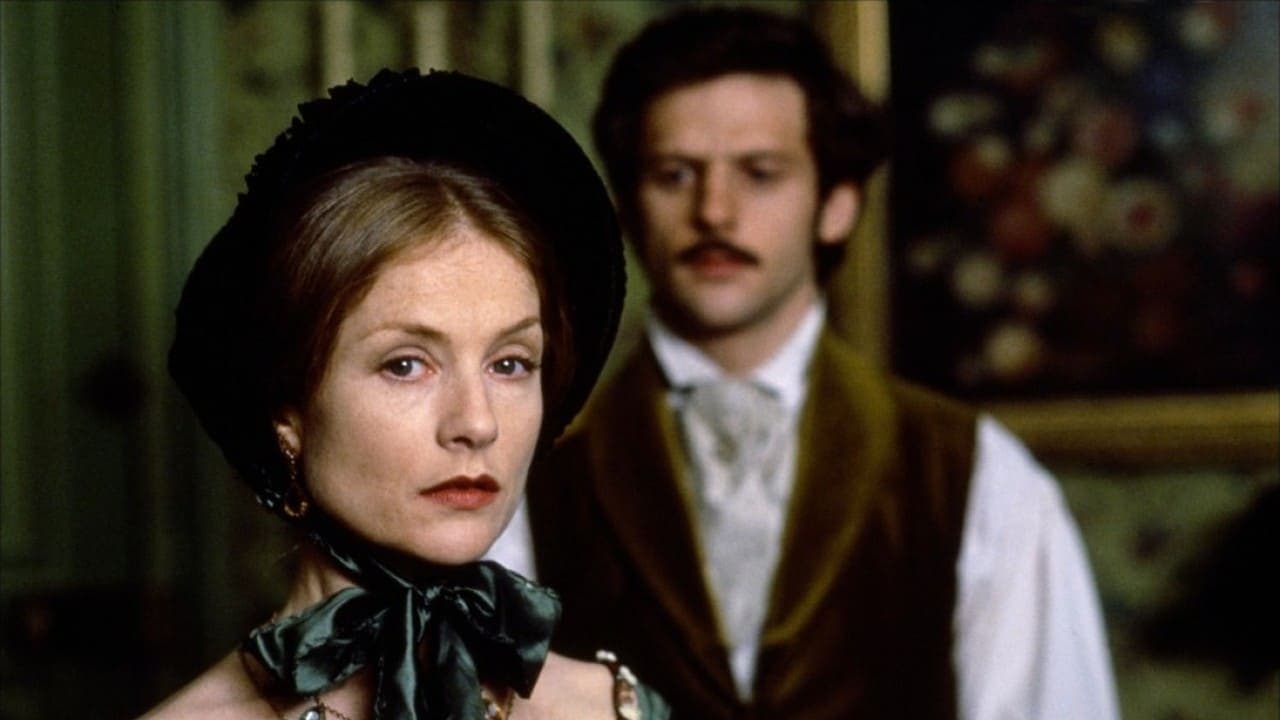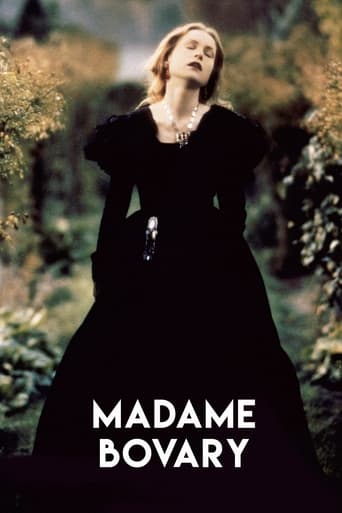

Anybody taking on Gustave Flaubert's Madame Bovary should get some credit for the effort, the book is a classic and one of the greatest pieces of European literature(it's also easy to see why it was so controversial at the time) but it isn't an easy one to adapt at all with some very easy traps to fall into(making the characters one-dimensional for one). Of the three adaptations of the book seen so far personally- the others being the 2000 and 1949 versions-, this one is the most faithful but also the one that resonated with me least. There is much to like still, for one it looks absolutely gorgeous with very picturesque scenery, evocative settings, make-up and costuming and photography that is elegant and alive with colour. The music is hauntingly understated and lyrical, underlying the atmosphere while letting the drama speak. Claude Chabrol directs with a deft if at times clinical hand, particularly good in showing how rigid socially and morally mid-19th century French provincial life was. The performances are also great. Isabelle Huppert can understandably be seen as cold(to be honest Emma is the main reason why the book adaptation-wise is not that accessible because it is not easy to feel genuine sympathy for her), especially compared to Frances O'Connor and Jennifer Jones, and maybe she is not youthful enough in the early scenes but her classic beauty makes her perfect for period drama and she does act with coolness and poise but there is a sense of being stifled and being a victim of her own passions. Jean-Francois Balmer is appropriately mild-mannered and sympathetic if somewhat equally appropriately clueless as her husband. While Christophe Malavoy has the suavity and enigmatic menace just right and Lucas Belvaux is gentle without being dull. Jean Yanne shows Homais' unscrupulousness very well, and Jean-Louis Maury is good also as the malefic L'Heureux. Some things didn't come across as well. That it is faithful in detail to the book is laudable(most of the dialogue word for word), but it is one of those cases like the 1974 adaptation of The Great Gatsby of being too faithful that the dialogue while astonishingly literate and poetic lacks spark and emotion, the irony that surrounds Emma's tragic plight doesn't come across very well. The voice over doesn't really serve a point to the storytelling when it could have easily been said or shown, and that it is incorporated late and sparingly further gives it that notion. The story of the book is slow to begin with so it was not a bad thing for the adaptation to match the book's pacing. The thing is though the book's love scenes were passionate and there is also a lot of irony and bite. That the love scenes here were more coy than passionate(some of the chemistry looks uncomfortable), themes like the anti-clerical statements(quite savage ones at that) used in the book being excised and the writing having the poetry but not the irony made it not so easy to engage with and it all feels rather tame. The first half is often very ponderous and there is the sense that while the details are there what made the book so meaningful and shocking was lost. Overall, looks beautiful, skilfully directed and well-acted, but as a result of being too faithful emotionally and spirit-wise it felt cold and rather tame. The 2000 and 1949 also weren't as biting as the book, and they were nowhere near as faithful, but did have what this version didn't have. 6/10 Bethany Cox
... View MoreIt is a high valuation for this movie but I give it because of the novel of Gustave Flaubert. From now on I am talking about the novel and the parts which one can see in the movie or about their cross-points.The rise of the street business, cafeterias, agents, notary, private spaces and thoughts, secrets and frauds, modernization, science, fragmentary ethics and the fall of moral, religion, the ordinary, trivial, village life. If you want. The point from where Socrates and Voltaire felt their power of being free and their weakness of losing their goal. So, the fall of the fundamental and traditional. The question and now what? And the answer - where I am at this moment.In conclusion, if you do not want to read the book - then watch the movie.http://vihrenmitevmovies.blogspot.com/
... View MoreThis movie was really deceptive to me. First, I wanted to watch it as I know that Isabelle Huppert and Claude Chabrol have amazing talents. After watching it, I thought that they both failed. I explain myself : Huppert is too pragmatic and cold to play this role. It seems like she plays every single scene as if she knew what kind of effect she will have on the people around. It's quite borrying. Emma Bovary is not Nana (from Zola's novel), she is someone who is not so interested in success, she is far more interested by passions. She is a woman living in dreams and thinking than life can be passionate as novels. I read the novel just a week before and I think that Flaubert describes well the fact that Emma Bovary is only interested in herself, in her feelings and in a "romanesque" conception of love. Huppert is far too pragmatic and not really romantic. Some scenes look "grotesque" as the one when after dancing with the Baron, she almost faints. It looks like Huppert uses a trick, which makes the scene look false. Moreover, she was probably too old to play the part of Emma Bovary (in the novel, Emma Bovary is twenty or thirty, surely not forty years old). Huppert got the part when she was almost forty and she looks too self-assured to play it well. For example, when she says to Rodolphe that she could have given her life for him, she bugles like mad woman though Emma is a passionate and really weak person. By never showing her weakness, Huppert don't find the good way to play this character.An actress like Anne Brochet or, Irène Jacob would have suited for the part perfectly (these two actresses look young enough). Isabelle Adjani would have probably been too passionate and not enough dreamy to play that part. Jeanne Balibar would have been great too. The other problem is in the way the movie is directed. The beginning of the story is all summed-up by Chabrol who doesn't show the fact that Emma Bovary and her husband Charles are far far different. The voice-over is not a great idea to explain that situation... and the fact that these scenes are so short make probably the actors play their part in a kind of caricature of themselves (which is the main problem of Huppert's interpretation). I think that Huppert and Chabrol were probably too confident to make that movie and that's probably why it can be so deceptive. The cinematography is not so intense and it looks like a movie made for TV. It could have been a quite good adaptation for a movie made for TV and released on a week evening but it's really not enough for a Cinema movie, made by two masters of Cinema.
... View MoreIsabelle Huppert plays the part very coldly, which makes the story more distant. She seems to view romantic sexual pleasure as something to be acquired instead of experienced. The medical scenes, however, are very well done and almost shocking in the staid context of the film's sensationless depiction of marital infidelity. Other Bovarys (Jennifer Jones and Frances O'Connor) have been much more sensual, whereas Isabel is pretty but it never seems that having sexual intercourse with her would be fun. Sorry to put it so crudely, but I always thought that sexual attraction was the point of the story, and also the source of its tragedy.
... View More